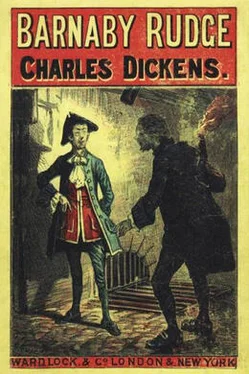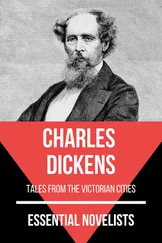'This is well done of you, sir, to corrupt my servants, and enter my house unbidden and in secret, like a thief!' said Mr Haredale. 'Leave it, sir, and return no more.'
'Miss Haredale's presence,' returned the young man, 'and your relationship to her, give you a licence which, if you are a brave man, you will not abuse. You have compelled me to this course, and the fault is yours—not mine.'
'It is neither generous, nor honourable, nor the act of a true man, sir,' retorted the other, 'to tamper with the affections of a weak, trusting girl, while you shrink, in your unworthiness, from her guardian and protector, and dare not meet the light of day. More than this I will not say to you, save that I forbid you this house, and require you to be gone.'
'It is neither generous, nor honourable, nor the act of a true man to play the spy,' said Edward. 'Your words imply dishonour, and I reject them with the scorn they merit.'
'You will find,' said Mr Haredale, calmly, 'your trusty go–between in waiting at the gate by which you entered. I have played no spy's part, sir. I chanced to see you pass the gate, and followed. You might have heard me knocking for admission, had you been less swift of foot, or lingered in the garden. Please to withdraw. Your presence here is offensive to me and distressful to my niece.' As he said these words, he passed his arm about the waist of the terrified and weeping girl, and drew her closer to him; and though the habitual severity of his manner was scarcely changed, there was yet apparent in the action an air of kindness and sympathy for her distress.
'Mr Haredale,' said Edward, 'your arm encircles her on whom I have set my every hope and thought, and to purchase one minute's happiness for whom I would gladly lay down my life; this house is the casket that holds the precious jewel of my existence. Your niece has plighted her faith to me, and I have plighted mine to her. What have I done that you should hold me in this light esteem, and give me these discourteous words?'
'You have done that, sir,' answered Mr Haredale, 'which must be undone. You have tied a lover's–knot here which must be cut asunder. Take good heed of what I say. Must. I cancel the bond between ye. I reject you, and all of your kith and kin—all the false, hollow, heartless stock.'
'High words, sir,' said Edward, scornfully.
'Words of purpose and meaning, as you will find,' replied the other. 'Lay them to heart.'
'Lay you then, these,' said Edward. 'Your cold and sullen temper, which chills every breast about you, which turns affection into fear, and changes duty into dread, has forced us on this secret course, repugnant to our nature and our wish, and far more foreign, sir, to us than you. I am not a false, a hollow, or a heartless man; the character is yours, who poorly venture on these injurious terms, against the truth, and under the shelter whereof I reminded you just now. You shall not cancel the bond between us. I will not abandon this pursuit. I rely upon your niece's truth and honour, and set your influence at nought. I leave her with a confidence in her pure faith, which you will never weaken, and with no concern but that I do not leave her in some gentler care.'
With that, he pressed her cold hand to his lips, and once more encountering and returning Mr Haredale's steady look, withdrew.
A few words to Joe as he mounted his horse sufficiently explained what had passed, and renewed all that young gentleman's despondency with tenfold aggravation. They rode back to the Maypole without exchanging a syllable, and arrived at the door with heavy hearts.
Old John, who had peeped from behind the red curtain as they rode up shouting for Hugh, was out directly, and said with great importance as he held the young man's stirrup,
'He's comfortable in bed—the best bed. A thorough gentleman; the smilingest, affablest gentleman I ever had to do with.'
'Who, Willet?' said Edward carelessly, as he dismounted.
'Your worthy father, sir,' replied John. 'Your honourable, venerable father.'
'What does he mean?' said Edward, looking with a mixture of alarm and doubt, at Joe.
'What DO you mean?' said Joe. 'Don't you see Mr Edward doesn't understand, father?'
'Why, didn't you know of it, sir?' said John, opening his eyes wide. 'How very singular! Bless you, he's been here ever since noon to–day, and Mr Haredale has been having a long talk with him, and hasn't been gone an hour.'
'My father, Willet!'
'Yes, sir, he told me so—a handsome, slim, upright gentleman, in green–and–gold. In your old room up yonder, sir. No doubt you can go in, sir,' said John, walking backwards into the road and looking up at the window. 'He hasn't put out his candles yet, I see.'
Edward glanced at the window also, and hastily murmuring that he had changed his mind—forgotten something—and must return to London, mounted his horse again and rode away; leaving the Willets, father and son, looking at each other in mute astonishment.
At noon next day, John Willet's guest sat lingering over his breakfast in his own home, surrounded by a variety of comforts, which left the Maypole's highest flight and utmost stretch of accommodation at an infinite distance behind, and suggested comparisons very much to the disadvantage and disfavour of that venerable tavern.
In the broad old–fashioned window–seat—as capacious as many modern sofas, and cushioned to serve the purpose of a luxurious settee—in the broad old–fashioned window–seat of a roomy chamber, Mr Chester lounged, very much at his ease, over a well–furnished breakfast–table. He had exchanged his riding–coat for a handsome morning–gown, his boots for slippers; had been at great pains to atone for the having been obliged to make his toilet when he rose without the aid of dressing–case and tiring equipage; and, having gradually forgotten through these means the discomforts of an indifferent night and an early ride, was in a state of perfect complacency, indolence, and satisfaction.
The situation in which he found himself, indeed, was particularly favourable to the growth of these feelings; for, not to mention the lazy influence of a late and lonely breakfast, with the additional sedative of a newspaper, there was an air of repose about his place of residence peculiar to itself, and which hangs about it, even in these times, when it is more bustling and busy than it was in days of yore.
There are, still, worse places than the Temple, on a sultry day, for basking in the sun, or resting idly in the shade. There is yet a drowsiness in its courts, and a dreamy dulness in its trees and gardens; those who pace its lanes and squares may yet hear the echoes of their footsteps on the sounding stones, and read upon its gates, in passing from the tumult of the Strand or Fleet Street, 'Who enters here leaves noise behind.' There is still the plash of falling water in fair Fountain Court, and there are yet nooks and corners where dun–haunted students may look down from their dusty garrets, on a vagrant ray of sunlight patching the shade of the tall houses, and seldom troubled to reflect a passing stranger's form. There is yet, in the Temple, something of a clerkly monkish atmosphere, which public offices of law have not disturbed, and even legal firms have failed to scare away. In summer time, its pumps suggest to thirsty idlers, springs cooler, and more sparkling, and deeper than other wells; and as they trace the spillings of full pitchers on the heated ground, they snuff the freshness, and, sighing, cast sad looks towards the Thames, and think of baths and boats, and saunter on, despondent.
It was in a room in Paper Buildings—a row of goodly tenements, shaded in front by ancient trees, and looking, at the back, upon the Temple Gardens—that this, our idler, lounged; now taking up again the paper he had laid down a hundred times; now trifling with the fragments of his meal; now pulling forth his golden toothpick, and glancing leisurely about the room, or out at window into the trim garden walks, where a few early loiterers were already pacing to and fro. Here a pair of lovers met to quarrel and make up; there a dark–eyed nursery–maid had better eyes for Templars than her charge; on this hand an ancient spinster, with her lapdog in a string, regarded both enormities with scornful sidelong looks; on that a weazen old gentleman, ogling the nursery–maid, looked with like scorn upon the spinster, and wondered she didn't know she was no longer young. Apart from all these, on the river's margin two or three couple of business–talkers walked slowly up and down in earnest conversation; and one young man sat thoughtfully on a bench, alone.
Читать дальше












